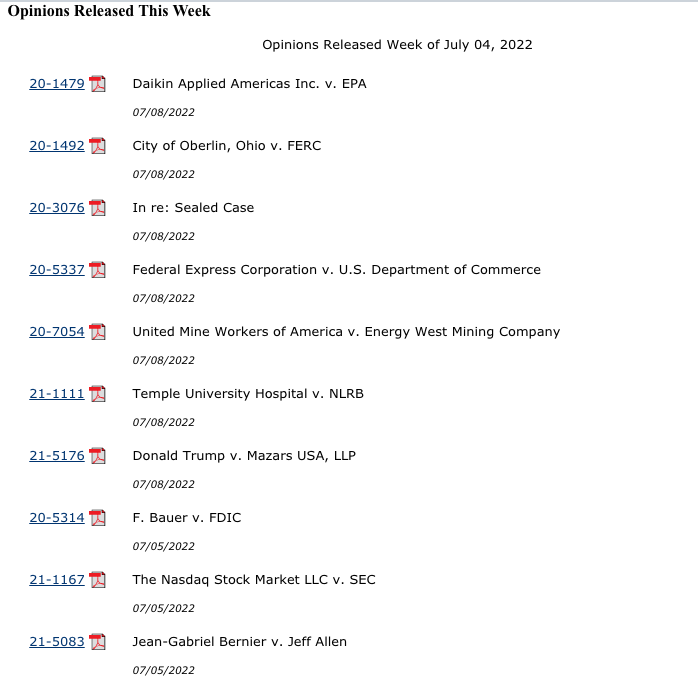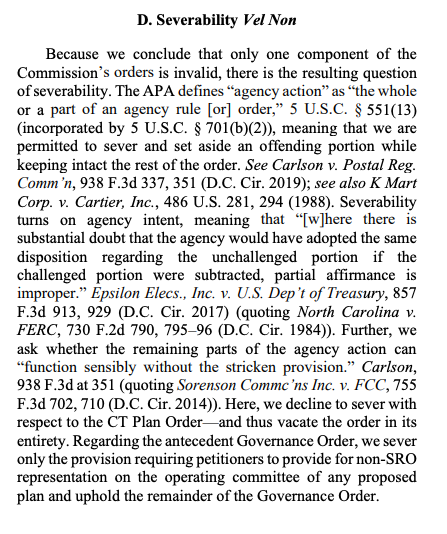D.C. Circuit Review – Reviewed: It Is Hard To Beat An Agency In Court
It was a busy week in the D.C. Circuit.* The Court decided 10 cases — some of which are quite substantial.

Because there are so many opinions this week, I’ll set aside the cases (Bernier v. Allen and United Mine Workers v. Energy West Mining Co.) that don’t involve administrative law. I’ll also ignore In re Sealed Case because I have no idea what it says.
That leaves seven cases. After reviewing them, I came away reminded of just how hard it can be to really defeat an agency.
For example, in Daikin Applied Americas Inc. v. EPA, Judge Henderson — joined by Chief Judge Srinivasan and Judge Pillard — upheld an EPA site-listing decision under CERLA: “The petitioners contend that the EPA arbitrarily ignored other possible sources of contamination in determining the site and that the EPA both ignored evidence disproving, and failed to provide adequate evidence of, aquifer interconnectivity. Because the EPA was not required to attribute the contamination to a specific source and adequately supported aquifer interconnectivity, we reject the petitioners’ claims and deny the petition for review.” (If you are interested, the discussion of supplementing the administrative record is worth a read.) In Federal Express Corp. v. U.S. Department of Commerce, Judge Millett — joined by Judge Sentelle, with Judge Henderson concurring in the judgment — upheld the agency’s decision to hold FedEx “strictly liable for aiding and abetting violations of the 2018 Export Controls Act” in light of, among other things, “deference to the Executive Branch in matters of national security and foreign affairs.” (If you are interested, FedEx is another case of non-statutory review; there also is a noteworthy discussion of whether strict liability offends due process.) And in Bauer v. FDIC, Judge Millett — joined by Judges Katsas and Randolph — concluded that the FDIC “has the power to determine whether a proposed payment qualifies as a golden parachute payment” even if the agency is not “presented with a precise dollar figure.” (I confess: I did not know until this opinion that evaluating payments for golden-parachute risk was part of the FDIC’s job. The Court’s discussion of the distinction between “between ‘procedural rules benefitting the agency’ and ‘procedural rules benefitting the party otherwise left unprotected by agency rules'” is also worth reviewing.)
Reading this week’s cases, however, I was struck by the fact that even if a party wins a round against an agency, the agency may still come out on top. (Cf. A Tale of Two Chenerys.) Consider Temple University Hospital v. NLRB. In 2019, the D.C. Circuit held that the NLRB misapplied judicial estoppel. On remand, however, “the NLRB again asserted jurisdiction over the Hospital after determining that principles of judicial estoppel are inapplicable.” Chief Judge Srinivasan — joined by Judge Henderson alone because now-Justice Jackson was part of the panel — concluded that “[t]he Board did not abuse its discretion in determining that judicial estoppel is unavailable in cases in which the Board’s jurisdiction is at issue.” Likewise, in City of Oberlin v. FERC, the Court previously held (also in 2019) that FERC had not adequately explained itself. On remand, the agency reached the same conclusion, and this time, the Court — Judge Rao, joined by Judges Rogers and Sentelle — upheld the FERC’s decision. (The Takings Clause discussion is noteworthy.)
On the subject of repeat cases, we have another case with the caption Trump v. Mazars about a House subpoena to Mazars USA regarding then-President Trump’s personal financial records. The Supreme Court in Trump v. Mazars disagreed with the D.C. Circuit’s first Trump decision, holding that the D.C. Circuit “did not take adequate account” of the “special concerns regarding the separation of powers” that arise in an interbranch fight between the House and the President. On remand, Chief Judge Srinivasan (joined by Judge Rogers who wrote a short concurrence; Justice Jackson was the third member of the panel) concluded that the “the heightened separation-of-powers scrutiny prescribed by the Supreme Court continues to govern in the unique circumstances of this case even though [Trump] is no longer the sitting President,” but that the House can “subpoena certain of President Trump’s financial records” — but not all it wants (the limitations of which are explained in detail for many pages ) — “in furtherance of the Committee’s enumerated legislative purposes.” There is a lot going on in this case: too much for an already overly long blog post. Suffice it to say, there is a very good chance that this case will prompt another certiorari petition. There is also a very good chance that a panel of the D.C. Circuit will soon enough find itself reviewing this opinion carefully — if it stands — should the House of Representatives flip this fall.
Finally, we come to Nasdaq Stock Market LLC v. SEC. Here, the agency lost in part. As explained by Judge Henderson (joined by Judges Wilkins and Sentelle), this case concerns “‘self-regulatory organizations’ (SROs), groups comprising, in large part, the major national securities exchanges for equity securities.” If you know what SROs are, you should probably read this opinion in full. If, however, you are like me, you should instead focus on the section of the opinion beginning “Severability Vel Non.” Here is a key paragraph:

But what if there is a severability clause? That does not necessarily control. If you would like to know why not, read the opinion.
* Unfortunately, the Court decides a lot of cases during the middle of summer. This week’s post will focus on the cases decided this week. It is worth noting, however, that the Senate is considering two nominees to join the Court: Judge Florence Pan and Brad Garcia. I asked the goods folks in the BYU Library to pull their respective records in the D.C. Circuit. Here is what I learned:
Judge Pan is listed as participating in nine cases before the D.C. Circuit — all criminal cases and in her capacity as an Assistant U.S. Attorney.
- U.S. v. Drew, 200 F.3d 871 (D.C. Cir. 2000). Pan argued.
- U.S. v. Harrison, 204 F.3d 236 (D.C. Cir. 2000). Pan argued.
- U.S. v. Johnson, 212 F.3d 1313 (D.C. Cir. 2000).
- U.S. v. Booker, 436 F.3d 238 (D.C. Cir. 2006).
- U.S. v. Broadie, 452 F.3d 875 (D.C. Cir. 2006). Pan argued.
- U.S. v. Dorcely, 454 F.3d 366 (D.C. Cir. 2006). Pan argued.
- U.S. v. Settles, 530 F.3d 920 (D.C. Cir. 2008).
- U.S. v. Keleta, 552 F.3d 861 (D.C. Cir. 2009).
- U.S. v. Guillen, 561 F.3d 527 (D.C. Cir. 2009).
Brad Garcia clerked on the D.C. Circuit, but as a litigator is only listed as being involved in one case (from last month):
- Air Transport Association of America, Inc. v. U.S. Department of Agriculture, 2022 WL 2203484 (June 21, 2022).
When my turn to post comes up again, perhaps I’ll have more time to discuss the nominees. I may also have something to say about a certain case of considerable significance to the D.C. Circuit — and one that proves that agencies don’t always win.
D.C. Circuit Review – Reviewed is designed to help you keep track of the nation’s “second most important court” in just five minutes a week.



